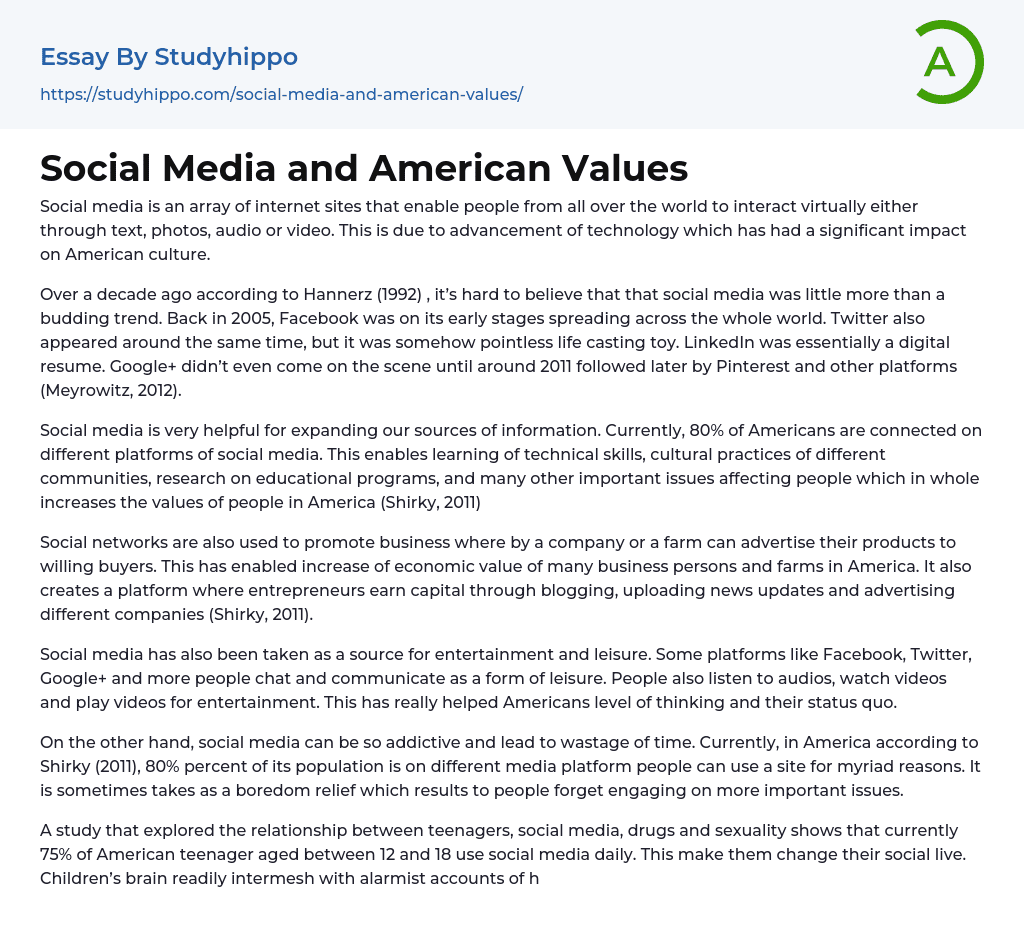Social media refers to various internet sites that allow individuals worldwide to engage in virtual interaction, whether through text, photos, audio, or video.
Advancements in technology have greatly influenced American culture. According to Hannerz (1992), it is astonishing to think that social media was once just a growing trend. In 2005, Facebook began its journey of spreading worldwide. Twitter emerged around the same time, although it was initially seen as a trivial form of life casting. LinkedIn primarily functioned as a digital resume.
According to Meyrowitz (2012), Google+ gained popularity in 2011 and was soon followed by platforms like Pinterest. Social media has greatly expanded the sources of information available to people. Currently, approximately 80% of Americans are connected on different social media platforms. This connectivity enables individuals to acquire technical skills, understand cultural practices of various communities, research educational pro
...grams, and address important issues that impact people in America.
In addition, as Shirky (2011) points out, social networks also offer businesses a means to promote their products to potential buyers. This leads to increased economic value for many businesses and farms across America.
Shirky (2011) suggests that social media offers various ways for entrepreneurs to generate income, including blogging, posting news updates, and advertising companies. Furthermore, it has also become a popular source of leisure and entertainment. Platforms like Facebook, Twitter, and Google+ enable casual communication while providing features such as audio listening, video watching, and gaming for entertainment purposes. These advancements have significantly impacted the mindset and established norms of Americans. However, it is essential to acknowledge that social media can result in addiction and time misuse.
In his 2011 publication, Shirky reports that currently, 80% of American
utilize various media platforms for different purposes, including entertainment. However, this can divert their attention from more crucial matters. A study focusing on the correlation between social media usage by teenagers aged 12 to 18 and drugs as well as sexuality discovered that 75% of American teenagers in this age group use social media daily, which leads to alterations in their social lives. Stories about hackers, pedophiles, internet trolls, identity theft, Trojan horses, phishing scams, viruses, and worms often easily influence young children. Consequently, numerous critics in America perceive the impact of social media on offline culture unfavorably (Gil de Zuniga 2012). Moreover, social networks have proven to be a potent tool for mobilization.
Through our own technological imperative, social media plays a significant role in social protest and serves as a platform for American social and political movements to communicate and advance their causes. This is exemplified by the radicalized jihadist youth in the western world (Meyrowitz 1986).
The impact of social media on individuals can vary depending on how it is used, whether in a positive or negative manner (Gil de Zuniga, 2012). Social media has the potential to be a valuable platform for personal growth and self-improvement. However, it also carries the risk of negative effects.
Reference
- Meyrowitz, J. (1986). No sense of place: The impact of electronic media on social behavior Oxford University Press.
- Shirky, C. (2011). The political power of social media: Technology, the public sphere, and political change. Foreign affairs, 28-41.
- Gil de Zuniga, H., Jung, N., & Valenzuela, S. (2012). Social media use for news and individuals' social capital, civic engagement and political participation. Journal of Computer-Mediated Communication , 17(3), 319-336.
- Hannerz,U.(1992). Cultural complexity: Studies
in the social organization of meaning.Columbia University Press.
- African American essays
- African American Culture essays
- American Values essays
- Asian American essays
- Chinese essays
- Ethnicity essays
- Ethnocentrism essays
- German essays
- Han Chinese essays
- Hispanic essays
- Identity essays
- Korean essays
- Mexican essays
- Nation essays
- Native American essays
- Race and Ethnicity essays
- White People essays
- Adolescence essays
- Childhood essays
- Growth Mindset essays
- Individual essays
- Infant essays
- Is Google Making Us Stupid essays
- Belief essays
- Deontology essays
- Ethical dilemma essays
- Moral essays
- Normative Ethics essays
- Values of Life essays
- Virtue essays
- Virtue Ethics essays
- Work Ethic essays




